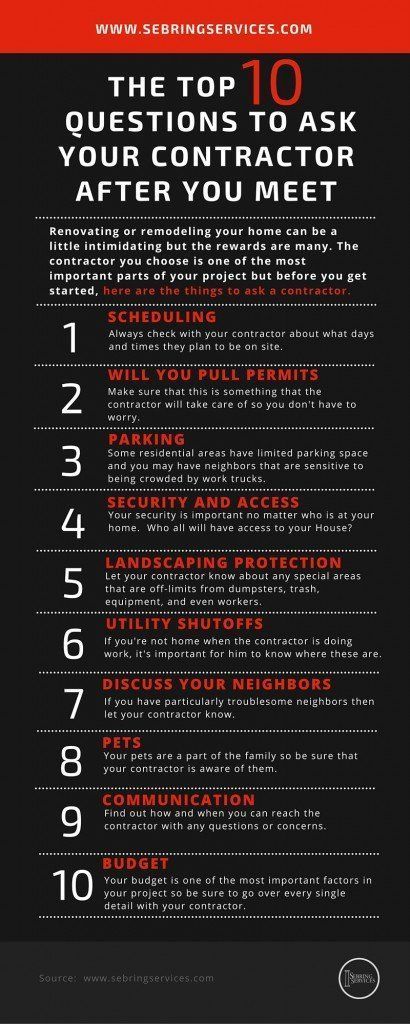
10 Questions to Ask Your Contractor
When it comes to making improvements or renovations to your home, finding the right contractor is essential. With so many professionals to choose from, it can be overwhelming to know where to start. That’s why we’ve compiled a list of 10 questions to ask your contractor before hiring them.
First and foremost, it’s crucial to ascertain whether the contractor is licensed and insured. This will ensure that they are qualified to carry out the work and that you will be protected in the event of any accidents or damages. Additionally, asking for references and examples of their previous work will give you an idea of their experience and the quality of their craftsmanship.
Next, you’ll want to find out how long the contractor has been in business. Generally, the more experience they have, the better. However, it’s also important to ask about their availability and timeline for your project. You want to ensure that they can complete the work within your desired timeframe.
Another crucial aspect to discuss is the contractor’s pricing. It’s important to have a clear understanding of their rates and any additional costs that may arise during the project. Additionally, asking about warranties and guarantees will give you peace of mind that they stand behind their work.
Lastly, it’s important to ask about the contractor’s communication and project management style. You’ll want to ensure that they will be readily available to address any concerns or questions you may have throughout the process. By asking these 10 questions, you can be confident in finding the right contractor for your home improvement project.
Experience: How Many Years Has the Contractor Been in Business?
When hiring a contractor for your home improvement project, it’s important to consider their level of experience. Asking about the number of years a contractor has been in business can offer valuable insight into their expertise and track record. Here are 10 questions to ask during your contractor interview:
-
How long have you been in the construction industry?
Knowing the contractor’s overall experience in the construction industry can give you an idea of their familiarity with different types of projects and industry standards.
-
How many years have you specifically been working as a contractor?
A contractor who has been providing their services for a significant number of years is likely to have a deeper understanding of construction processes, problem-solving skills, and project management.
-
What types of projects have you worked on in the past?
Understanding the range of projects a contractor has worked on can help you evaluate their ability to handle your specific project. For example, if you’re looking to renovate a kitchen, you might want to hire a contractor with experience in kitchen remodeling.
-
Do you have any certifications or licenses?
Contractors who have obtained certifications or licenses demonstrate a commitment to professionalism and continued education. It’s important to ensure that they hold the necessary licenses required by your local jurisdiction.
-
Can you provide references from past clients?
Requesting references allows you to get in touch with previous clients and inquire about their experience working with the contractor. You can ask about the quality of work, timeliness, and overall satisfaction.
-
Have you ever worked on projects similar to mine?
A contractor who has experience in projects similar to yours may have better insights and a more efficient approach to solving any challenges that may arise during the project.
-
What is your process for managing projects?
Understanding the contractor’s project management process can help you gauge their organizational skills and ability to meet deadlines. They should have a clear plan for communication, scheduling, and budgeting.
-
Do you have a portfolio of past projects?
Reviewing a contractor’s portfolio allows you to visually assess the quality of their work. Look for projects that are similar to yours and pay attention to details, craftsmanship, and overall aesthetic.
-
Are you insured?
It’s crucial to hire a contractor who carries liability insurance and workers’ compensation insurance. This protects you from financial liability in case of accidents or property damage during the project.
-
What warranties or guarantees do you offer?
Inquire about the contractor’s warranties or guarantees on their work. A reputable contractor should stand behind their craftsmanship and offer a warranty to address any potential issues that may arise after the project is completed.
By asking these questions and carefully evaluating the contractor’s responses, you can make an informed decision and choose a trustworthy professional with the necessary experience to successfully complete your project.
Portfolio: Can the Contractor Provide Examples of Their Past Work?
When interviewing a contractor for your upcoming project, it is essential to ask questions that will help you determine whether they have the necessary skills and experience to meet your needs. One crucial question to ask is whether the contractor can provide examples of their past work. Reviewing their portfolio can give you valuable insights into their abilities and the quality of their craftsmanship.
Here are 10 questions to ask your contractor about their portfolio:
- Can you show me examples of projects similar to mine? By asking this question, you can assess whether the contractor has experience working on projects similar to yours. Seeing their past work in a similar field can give you confidence in their ability to handle your specific project.
- How many years of experience do you have? Knowing how long the contractor has been in business can provide you with an idea of their expertise and knowledge. Contractors with a long history of successful projects demonstrate their ability to adapt and deliver quality work.
- Can you provide references? Requesting references from past clients allows you to contact them and inquire about their experience working with the contractor. References can give you honest feedback about the contractor’s professionalism, communication, and the overall satisfaction with their work.
- What types of projects do you specialize in? Understanding the contractor’s specialization can help you determine whether they are the right fit for your project. If they specialize in renovations, for example, they may not be the best choice for a new construction project.
- Can you provide testimonials or customer reviews? Testimonials and customer reviews can provide you with additional insights into the contractor’s reputation and the satisfaction of their past clients. Positive reviews and testimonials indicate a contractor that consistently delivers quality work and meets their clients’ expectations.
- Do you have before and after photos of your projects? Examining before and after photos can give you a clear idea of the contractor’s ability to transform a space. It allows you to evaluate the quality of their workmanship and their attention to detail.
- What is the largest project you have completed? Asking about the contractor’s experience in handling large-scale projects can help determine if they have the resources and team to handle your project efficiently and effectively.
- Do you have any trade certifications or licenses? Inquiring about a contractor’s certifications or licenses ensures that they meet the necessary requirements to work in their field. It also indicates their commitment to professional development and staying up-to-date with industry standards.
- Can you explain your design process? Understanding the contractor’s design process can help you determine if their approach aligns with your vision. It allows you to assess their creativity and problem-solving skills.
- Can you provide a detailed breakdown of the costs? Requesting a breakdown of costs helps you understand how the contractor charges for their services and what expenses to expect. It ensures that you are on the same page regarding the budget and prevents any surprises down the line.
By asking these questions and reviewing the contractor’s portfolio, you can gain a better understanding of their past work, skills, and capabilities. This information will help you make an informed decision and choose the right contractor for your project.
Licenses and Insurance: Is the Contractor Licensed and Insured?
When hiring a contractor for your home improvement project, one of the most important factors to consider is whether or not they are licensed and insured. This is crucial for both your peace of mind and the protection of your property.
Here are 10 questions to ask during the interview process to ensure the contractor is properly licensed and insured:
- Are you licensed? Ask the contractor if they hold a valid license for the work they will be performing. Different states and localities have different licensing requirements, so make sure the contractor meets the necessary qualifications.
- What type of insurance coverage do you have? Inquire about the contractor’s insurance coverage, including liability insurance and worker’s compensation. This will protect you from any potential accidents or damages that may occur during the project.
- Can you provide proof of insurance? Ask the contractor to provide proof of their insurance coverage. This can be in the form of certificates of insurance or copies of their insurance policies.
- Are you bonded? Bonding provides an additional layer of protection for both you and the contractor. It ensures that the contractor will fulfill their obligations and complete the work according to the agreed-upon terms.
- Do you have any certifications? Inquire about any additional certifications or professional affiliations the contractor may have. This can be an indication of their commitment to staying up-to-date with industry standards and best practices.
- Have you ever had any legal disputes or complaints filed against you? Ask the contractor if they have ever been involved in any legal disputes or if any complaints have been filed against them. This will help you gauge their reputation and reliability.
- Do you use subcontractors? If the contractor uses subcontractors, make sure they are also licensed and insured. You want to ensure that everyone working on your project is qualified and properly protected.
- Will you obtain all necessary permits? Depending on the scope of your project, permits may be required. Ask the contractor if they will handle the permitting process or if that will be your responsibility.
- Can you provide references? Request references from past clients who can vouch for the contractor’s workmanship and professionalism. Contact these references to gain insights into their experiences working with the contractor.
- Do you offer any warranties? Inquire about any warranties or guarantees the contractor offers for their work. This will give you added assurance that they stand behind the quality of their craftsmanship.
By asking these 10 questions and thoroughly vetting the contractor’s licenses and insurance, you can confidently make an informed decision when choosing the right professional for your project.
References: Can the Contractor Provide References from Previous Clients?
Before hiring a contractor, it’s important to gather as much information as possible about their previous work and client satisfaction. One way to do this is by asking the contractor for references from previous clients. This allows you to speak directly with their past customers to get a better understanding of the quality of their work, their professionalism, and their overall reliability.
When you meet with the contractor, be sure to request a list of references that includes the names and contact information of at least 10 previous clients. This will give you a wide range of perspectives to consider and help you gauge the contractor’s consistency in delivering satisfactory results.
Once you have the list of references, take the time to contact each individual and ask them a series of questions regarding their experience with the contractor. Here are a few key questions to ask:
- Did the contractor complete the project on time? Timeliness is an important factor to consider, as delays can lead to increased costs and disruptions to your daily life.
- Were you satisfied with the quality of the work? This question will give you insight into the contractor’s craftsmanship and attention to detail.
- Did the contractor communicate effectively throughout the project? Communication is crucial in any construction project, so it’s important to ensure that the contractor can effectively convey progress, challenges, and any changes that may arise.
- Was the contractor professional and respectful? Professionalism and respect are key attributes to look for in a contractor, as they can greatly influence the overall experience.
- Were there any unexpected costs or issues that arose during the project? It’s important to understand if the contractor encountered any unforeseen challenges and how they handled them.
Tip: It’s always a good idea to ask for both positive and negative feedback from the references. This will give you a more well-rounded understanding of the contractor’s strengths and weaknesses.
By speaking with past clients, you can gain valuable insights into the contractor’s work ethic, reliability, and overall satisfaction level. This information will help you make a more informed decision and choose a contractor who is not only skilled but also a good fit for your specific project.
Project Timeline: What Is the Estimated Timeline for the Project?
When interviewing potential contractors for your project, it’s crucial to ask about the estimated timeline for the project. Understanding how long the project is expected to take can help you plan accordingly and manage your expectations.
Here are 10 questions to ask your contractor about the project timeline:
- What is the estimated start date for the project?
Knowing when the project is expected to begin can help you coordinate with other contractors and make necessary arrangements. - How long do you anticipate the project will take?
This will give you an idea of the overall timeline and help you plan accordingly. - Are there any factors that could potentially delay the project?
Understanding potential delays can help you manage your expectations and prepare for any unforeseen circumstances. - Do you have a detailed schedule outlining the different stages of the project?
Having a detailed schedule can help you track progress and ensure that everything stays on track. - How many crew members will be working on the project?
Knowing the size of the crew can help you estimate how long the project will take and how it will be managed. - What is your availability during the project?
Ensuring that the contractor will be available when needed can help prevent delays and ensure smooth communication. - Will you be working solely on this project or multiple projects simultaneously?
Understanding the contractor’s workload can help you gauge their ability to dedicate sufficient time and resources to your project. - Do you have any potential conflicts that could affect the project timeline?
Identifying any potential conflicts ahead of time can help you plan accordingly and make any necessary adjustments. - How often will we have progress updates?
Regular progress updates can help you stay informed about the project’s status and address any concerns or issues that may arise. - What happens if the project timeline is not met?
Understanding what measures will be taken if the project timeline is not met can help you assess the contractor’s accountability and problem-solving abilities.
By asking these questions and including them in your interview list, you can ensure that you have a clear understanding of the estimated timeline for the project and make an informed decision when choosing the right contractor for your needs.
Cost and Payment: What Is the Total Cost of the Project and What Are the Payment Terms?
When hiring a contractor for your project, it’s important to have a clear understanding of the total cost and payment terms. This will help you determine if the contractor’s services fit within your budget and allow you to plan your finances accordingly. Here are 10 questions to ask your contractor about the cost and payment:
- What is the total cost of the project? It’s crucial to know the overall cost of the project to ensure it aligns with your budget. Ask your contractor for a detailed breakdown of the costs, including materials, labor, and any additional fees.
- Are there any potential additional costs? Find out if there are any possible additional expenses that may arise during the course of the project. This could include unexpected repairs or changes in design.
- What is the payment schedule? Ask your contractor about the payment schedule. Will you be required to make a down payment? How often will you need to make payments throughout the project? Understanding the payment schedule will help you plan your finances accordingly.
- Do you offer financing options? Inquire if the contractor offers any financing options, such as payment plans or loans. This can be helpful if you need assistance with funding the project.
- Do you require a deposit? Some contractors may require a deposit before they start the work. Make sure to clarify the deposit amount and when it is due.
- What are the accepted forms of payment? Find out what forms of payment the contractor accepts. This will help you prepare the necessary payment method, whether it’s cash, check, or credit card.
- What happens if there are delays in payment? Discuss with the contractor what the consequences might be if there are delays in payment. Will there be late fees or additional charges?
- Is there a warranty on the work? Inquire about any warranties offered by the contractor. This will give you peace of mind knowing that the work is guaranteed for a certain period of time.
- What is your cancellation policy? It’s important to know the contractor’s cancellation policy in case you need to make any changes or cancel the project altogether. Understand any potential penalties or fees that may apply.
- Can I get a written agreement? Ask the contractor if they provide a written agreement that outlines all the details of the project, including the cost and payment terms. Having everything in writing will protect both parties and ensure that there are no misunderstandings.
By asking these questions and discussing the cost and payment terms with your contractor, you can make an informed decision and avoid any surprises or financial issues during the project.
Communication: How Will the Contractor Keep You Informed about the Progress of the Project?
When hiring a contractor for your home improvement project, it’s crucial to establish clear lines of communication. You want to make sure that your contractor keeps you informed about the progress of the project every step of the way. To ensure effective communication, here is a list of 10 important questions to ask your contractor:
- What is your preferred method of communication? It’s important to establish the best way to reach your contractor, whether it’s phone calls, email, or text messaging.
- How often will you provide updates? You should know how frequently you can expect progress updates from your contractor. Regular updates will help you stay informed about the project.
- Will there be a designated point of contact? It’s important to have a single point of contact to avoid confusion. This person will be responsible for relaying updates and answering your questions.
- What information will be included in the updates? Make sure to ask your contractor what type of information will be included in the progress updates. This may include the work completed, upcoming milestones, and any changes or issues that arise.
- Can I request additional updates? Find out if you can request additional updates or if there are any limitations on the frequency of communication.
- Will there be formal meetings? In addition to regular updates, ask if there will be any formal meetings to discuss the progress, address concerns, or make any necessary decisions.
- What happens if there are delays? It’s important to address how delays will be communicated and what actions will be taken to keep the project on track.
- How will you handle unexpected issues? Ask your contractor about their process for handling unexpected issues or changes that may arise during the project.
- Will there be documentation of progress? Find out if your contractor will provide documentation of the progress, such as photos or written reports.
- How can I reach you in case of an emergency? Make sure to ask for emergency contact information in case you need to reach your contractor outside of regular communication channels.
By asking these questions, you can establish clear expectations for communication with your contractor throughout the project. Effective and regular communication will help ensure that the project progresses smoothly and that any issues or concerns are addressed in a timely manner.
Subcontractors: Will the Contractor Use Subcontractors for Any Part of the Project?
When hiring a contractor for a home improvement project, it’s important to understand if they will be using subcontractors to complete any part of the work. Subcontractors are individuals or companies that the contractor hires to perform specific tasks or services on the project.
It’s essential to interview the contractor and ask the following questions to gain clarity on their use of subcontractors:
- Will you be using subcontractors for any part of the project? This is a straightforward question to ask to determine if the contractor plans on outsourcing any work.
- What specific tasks or services will be performed by subcontractors? Ask for specifics on which aspects of the project the contractor plans on delegating to subcontractors.
- How do you select subcontractors? Inquire about the contractor’s process for choosing subcontractors to ensure they have reliable and qualified professionals working on your project.
- Are your subcontractors licensed and insured? It’s crucial to ensure that any subcontractors used by the contractor have the necessary licenses and insurance coverage to protect you from liabilities.
- Can I see references or examples of projects completed by your subcontractors? Requesting references or examples will give you an idea of the quality of work performed by subcontractors the contractor has worked with in the past.
- Who will be responsible for overseeing the subcontractors? Clarify if the contractor or someone else on their team will be responsible for supervising the subcontractors to ensure the work meets your expectations.
- What happens if there are issues with the subcontractors’ work? Understand how the contractor handles any issues or conflicts that may arise with subcontractors during the project.
- Will there be any additional costs associated with subcontractor work? Ask if there are any additional fees or charges associated with subcontractor work that you need to be aware of upfront.
- How will subcontractor scheduling be managed? Learn how the contractor plans on coordinating and managing the schedules of both their team and any subcontractors to ensure a smooth and timely completion of the project.
- Will you provide a written agreement detailing the subcontractor arrangements? It’s important to have a written agreement that clearly outlines the subcontractor arrangements to avoid any misunderstandings or disputes down the line.
By asking these questions, you can create a comprehensive list of information regarding the use of subcontractors by the contractor. This will help you make an informed decision when selecting the right professional for your project.
Permits and Regulations: Will the Contractor Handle the Permits and Ensure Compliance with Building Regulations?
When hiring a contractor for a construction or renovation project, it is important to ask whether they will handle the necessary permits and ensure compliance with building regulations. This is crucial to avoid any legal issues and to ensure that the project is completed safely and according to the required standards.
Here is a list of questions you can ask the contractor during the interview to determine if they will handle permits and regulations:
- Will you obtain the necessary permits for the project?
- Are you familiar with the local building codes and regulations?
- Will you handle any inspections required during the construction process?
- How do you ensure compliance with building regulations?
- What happens if there are changes to the project that require additional permits?
It is the responsibility of the contractor to obtain the required permits for the project. This may include building permits, electrical permits, plumbing permits, and any other permits required by the local authorities. Make sure the contractor is aware of the permits needed for your project and is willing to handle the application process.
Each area has its own set of building codes and regulations that need to be followed during construction or renovation projects. It is essential that the contractor is familiar with these codes and regulations to ensure compliance. Ask the contractor if they have experience working in your area and if they are up to date with the latest building codes.
During the construction or renovation process, inspections may be required at various stages to ensure compliance with building regulations. Ask the contractor if they will handle scheduling and coordinating these inspections with the relevant authorities, such as building inspectors or fire marshals. This will help to ensure that the project progresses smoothly and in accordance with the regulations.
It is important to know how the contractor ensures compliance with building regulations throughout the project. They should have processes in place to monitor the work and ensure that it meets the required standards. Ask the contractor about their quality control measures and how they address any issues that arise during the construction or renovation process.
In some cases, changes to the project may require additional permits. Ask the contractor how they handle such situations and if they will be responsible for obtaining the necessary permits. This will help you avoid any delays or complications during the project.
Asking these questions will give you a better understanding of how the contractor handles permits and ensures compliance with building regulations. It is important to choose a contractor who is knowledgeable, experienced, and reliable in this aspect to ensure a successful and hassle-free construction or renovation project.
Contract: Will the Contractor Provide a Detailed Written Contract? What Will It Include?
When interviewing contractors for your project, it’s essential to ask whether they provide a detailed written contract and what it will include. A contract serves as a legally binding agreement between you and the contractor, outlining the scope of work, project timelines, and financial arrangements. Having a detailed contract is crucial to ensuring that both parties are on the same page and that there are no misunderstandings or disputes during the project.
Here are some questions to ask about the contractor’s contract:
- Will the contract be provided in writing? It is essential to have a written contract rather than a verbal agreement, as written documents are enforceable in court, whereas verbal agreements can be challenging to prove.
- What are the specific details included in the contract? The contract should clearly outline the project’s scope, including what work will be done, what materials will be used, and any specific requirements or specifications.
- What is the timeline for the project? The contract should specify the start and end dates of the project, as well as any important milestones or deadlines throughout the process.
- What is the payment schedule? The contract should include a payment schedule that outlines when and how much you will need to pay for the project. This may include a deposit at the start of the project and progress payments at specific milestones.
- Are there any contingencies or allowances? The contract should address any potential contingencies or allowances that may arise during the project. For example, if unexpected issues or additional work is needed, how will it be handled, and what will be the associated costs?
- What are the terms for termination or cancellation? The contract should specify the conditions under which either party can terminate or cancel the agreement, as well as any associated fees or penalties.
- Are there any warranty or guarantee provisions? The contract should outline any warranties or guarantees provided by the contractor for their work. This could include a specified period during which the contractor will address any defects or issues that arise.
- Are there any additional costs or fees? The contract should clearly state any additional costs or fees that may be incurred during the project, such as permit fees or disposal fees.
- What are the dispute resolution procedures? The contract should include procedures for resolving any disputes that may arise during the project, such as mediation or arbitration.
- Can the contract be amended? It’s important to know whether the contract can be amended if there are any changes or modifications to the project. If so, the process for making these amendments should be specified in the contract.
By asking these questions and ensuring that the contractor provides a detailed written contract, you can protect both yourself and the contractor and minimize the potential for misunderstandings or conflicts. Remember to review the contract carefully before signing and seek legal advice if needed.
Find the Right Contractor for Your Project
When starting a home renovation or construction project, finding the right contractor is crucial. The contractor you choose will play a significant role in the success of your project, so it’s important to ask the right questions during the interview process. Here is a list of 10 questions to ask your contractor:
- Are you licensed and insured? It’s essential to ensure that the contractor you hire has the necessary licenses and insurance coverage to protect you from any liability.
- What experience do you have? Ask about the contractor’s experience in handling projects similar to yours. This will give you an idea of their expertise and familiarity with your specific needs.
- Can you provide references? Request a list of references from past clients. Contact these references to get feedback on the contractor’s work quality, communication, and reliability.
- How do you handle project timelines? Inquire about the contractor’s approach to project timelines. Ensure they can meet your desired completion date and discuss any potential delays or obstacles that may arise.
- What is the proposed budget for my project? Ask for a detailed breakdown of costs and expenses. It’s important to have a clear understanding of the financial aspect of your project to avoid any surprises or disputes later on.
- Will you be subcontracting any parts of the project? Some contractors may hire subcontractors for specific tasks. If so, ensure that these subcontractors are also licensed and insured, and inquire about the contractor’s oversight of their work.
- How do you handle communication and updates? Establish clear lines of communication with your contractor. Discuss how frequently you will receive project updates and how you can reach them with any questions or concerns.
- What is your process for handling changes or modifications? It’s common for projects to evolve or require changes along the way. Discuss how change orders will be handled, including cost implications and any necessary approvals.
- What warranties do you offer? Inquire about the warranties or guarantees provided for the work performed. This will give you peace of mind knowing that any issues that arise after completion will be addressed.
- Do you have any ongoing or upcoming projects that may affect my project? Ensure that the contractor’s workload allows for dedicated attention to your project. Discuss any potential conflicts or scheduling concerns that may arise.
Asking these questions during the contractor interview process will help you gather the necessary information to make an informed decision. Remember to take notes and compare the responses from different contractors to ensure you find the right professional for your project.
Make an Informed Decision
When it comes to hiring a contractor for your home improvement project, it’s important to make an informed decision. Conducting an interview with potential contractors is a crucial step in the process. By asking the right questions, you can gather valuable information and assess whether the contractor is the right fit for your needs.
To ensure that you cover all the important aspects, it’s a good idea to create a list of questions to ask the contractor during the interview. Here are the top 10 questions you should ask:
- Are you licensed and insured? It’s essential to work with a contractor who is licensed and insured to protect yourself and your property in case of any accidents or damages.
- What experience do you have in this type of project? It’s important to hire a contractor who has experience in handling similar projects. Their expertise will ensure that the job is done correctly and efficiently.
- Can you provide references? Asking for references is a great way to gauge the contractor’s past work and get feedback from previous clients. Contacting these references will give you a better understanding of the contractor’s professionalism and work quality.
- What is the timeline for this project? Understanding the timeline will help you plan accordingly and ensure that the project progresses smoothly. It’s essential to have a clear understanding of when the contractor will start and finish the job.
- What is the estimated cost of the project? Getting an estimate will allow you to budget and plan for the project. Make sure to include all the required materials, labor costs, and any potential additional costs that may arise.
- Do you provide a warranty? A warranty will give you peace of mind knowing that the contractor stands behind their work. Ask about the length of the warranty and what it covers.
- Who will be on-site during the project? Knowing who will be responsible for overseeing the project and who will be working on-site will help you understand the coordination and communication process.
- How do you handle changes or unexpected issues? It’s important to know how the contractor handles any changes in the project scope or unexpected issues that may arise during the construction process.
- What is your payment schedule? Understanding when and how payments will be made is crucial. Make sure the payment schedule aligns with your budget and project milestones.
- Do you have any certifications or specializations? If your project requires specialized knowledge or certifications, make sure the contractor has the necessary qualifications to complete the work.
By asking these questions to the contractor, you’ll have a better understanding of their qualifications, experience, and work ethic. This information will help you make an informed decision and choose the right contractor for your project.
Hiring a Contractor: Things to Keep in Mind
When it comes to hiring a contractor, there are a few important things to keep in mind. This list of 10 questions can help guide your interview process and ensure that you find the right professional for the job.
- Do you have the necessary licenses and insurance? It’s important to verify that the contractor is properly licensed and insured to protect yourself and your property.
- Can you provide references from past clients? Checking references is a great way to get a sense of the contractor’s quality of work and customer satisfaction.
- What is your experience with projects similar to mine? The contractor’s experience with similar projects can give you confidence that they have the necessary skills and knowledge.
- What is the timeline for the project? Understanding the timeline can help you plan accordingly and ensure that the contractor’s schedule aligns with yours.
- Do you subcontract any of the work? If the contractor uses subcontractors, it’s important to know their qualifications and ensure that they are also licensed and insured.
- What is the payment schedule? Clearly understanding the payment schedule can help prevent any misunderstandings or conflicts later on.
- How do you handle any unexpected issues or changes during the project? It’s important to know how the contractor will handle any unexpected challenges that may arise and any changes that need to be made to the original plan.
- Will you provide a written contract? Having a written contract that outlines all of the project details, including costs, timelines, and warranties, is essential to protect both parties.
- What warranties do you offer? Understanding the warranties on the workmanship and materials can give you peace of mind and protect you from any future issues.
- How do you handle any disputes? It’s important to know the contractor’s process for resolving disputes in case any issues arise during or after the completion of the project.
By asking these 10 questions during the interview process, you can gather important information and make an informed decision when hiring a contractor. Remember to take notes, compare responses, and trust your gut instincts to find the right professional for your project.
Questions and answers:
How do I find a reliable contractor?
When looking for a reliable contractor, it’s important to do your research. Ask friends and family for recommendations, check online reviews, and make sure to ask for references from any potential contractors. It’s also a good idea to interview multiple contractors and get a written estimate before making a decision.
What questions should I ask a contractor before hiring them?
Before hiring a contractor, ask them about their experience in the industry, any certifications or licenses they hold, and if they have insurance coverage. It’s also important to ask for a detailed timeline of the project, as well as a breakdown of the costs and payment schedule. Additionally, don’t forget to ask about any warranties or guarantees offered by the contractor.
What should be included in a contract with a contractor?
A contract with a contractor should include important details such as the scope of work, a detailed description of materials and products used, project timeline, payment schedule, and any warranties or guarantees provided. It’s also important to include a clause about how any changes or additional work will be handled. Both parties should review and sign the contract before work begins.
What should I do if I’m not satisfied with the contractor’s work?
If you’re not satisfied with a contractor’s work, it’s important to address the issue as soon as possible. Begin by discussing your concerns with the contractor and giving them an opportunity to rectify the situation. If the issue can’t be resolved, consider seeking mediation or arbitration. In extreme cases, you may need to take legal action.
What are some red flags to watch out for when hiring a contractor?
There are several red flags to watch out for when hiring a contractor. Be wary of contractors who ask for large upfront payments, refuse to provide references or proof of insurance, or pressure you into making a quick decision. It’s also a bad sign if a contractor gives you a significantly lower estimate than others or avoids answering your questions directly. Trust your instincts and don’t be afraid to walk away if something seems off.
How do I find the right contractor for my project?
Finding the right contractor for your project can be a daunting task. However, there are several steps you can take to ensure you find the right professional. First, ask for recommendations from friends, family, or neighbors who have recently completed a similar project. You can also search online directories or review websites to find contractors in your area. Once you have a list of potential contractors, make sure to interview each one to assess their skills, experience, and credentials. Finally, ask for references and check them to ensure that the contractor has a good reputation.





